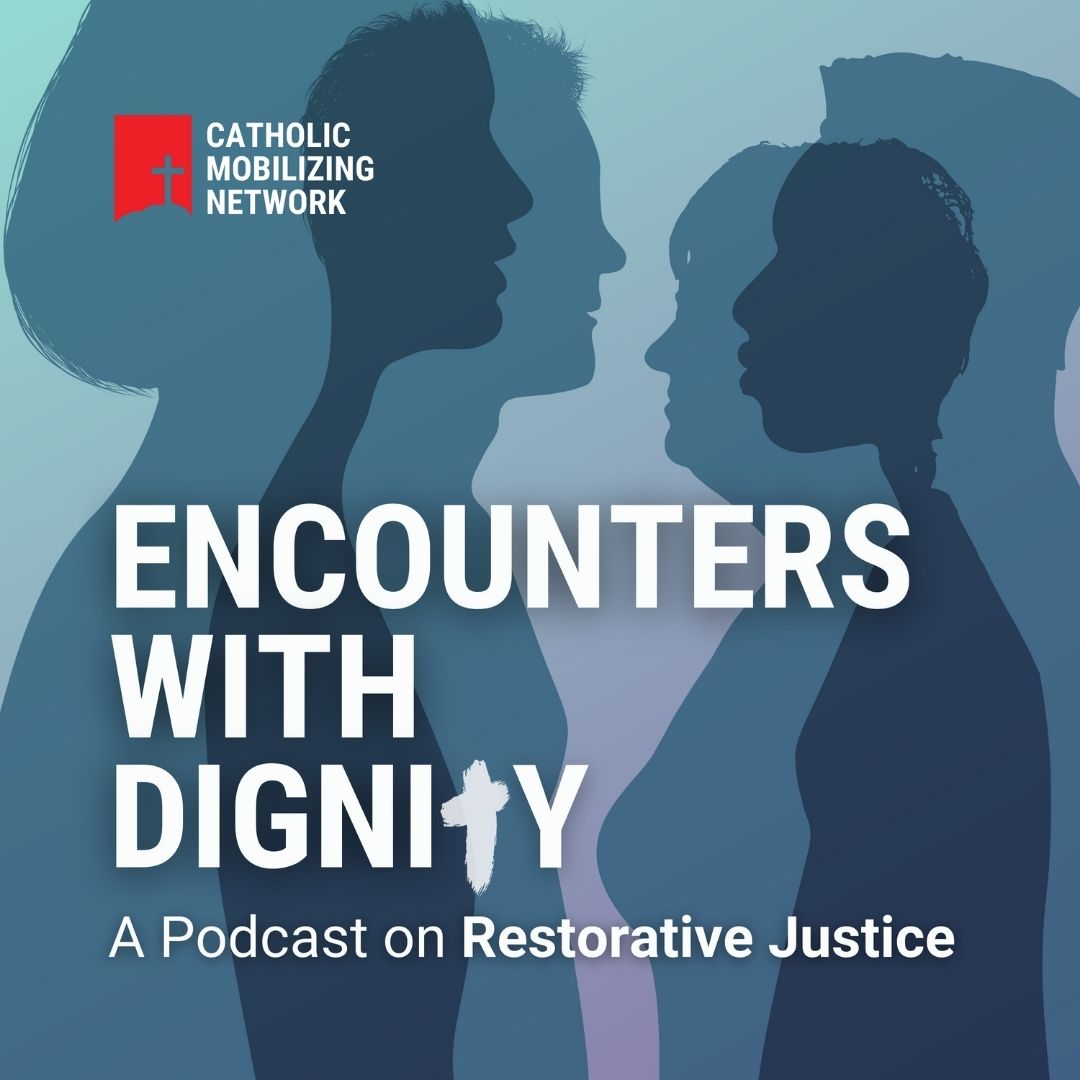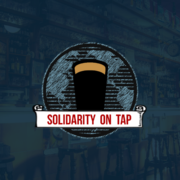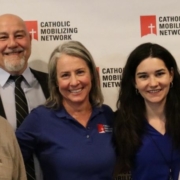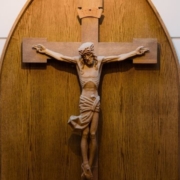Restorative Justice Explored in New Podcast from Catholic Mobilizing Network
BY ISN STAFF | May 10, 2022
Editor’s Note: ISN recently spoke with Caitlin Morneau, director of restorative justice for Catholic Mobilizing Network (CMN), a national organization working to end the death penalty and promote restorative justice. CMN recently launched Encounters with Dignity, a new podcast focused on the work of restorative justice.
ISN: Caitlin, thanks so much for talking with us. Can you tell us about yourself and your work?
Caitlin: You bet. My name is Caitlin Morneau and I get to serve as Catholic Mobilizing Network’s (CMN) director of restorative justice. Broadly, that means I oversee programming that invites Catholics to either learn about restorative justice in the light of their faith, or discern ways to engage with restorative practices in their areas of ministry. What this looks like in practice is developing resources and coordinating events that show how we can not only dismantle violent practices like the death penalty, but also build up reconciling approaches to justice through a culture of encounter.
restorative justice. Broadly, that means I oversee programming that invites Catholics to either learn about restorative justice in the light of their faith, or discern ways to engage with restorative practices in their areas of ministry. What this looks like in practice is developing resources and coordinating events that show how we can not only dismantle violent practices like the death penalty, but also build up reconciling approaches to justice through a culture of encounter.
At the heart of all this work is relationships—building relationships with victims of crime, with currently or formerly incarcerated persons, with curious and courageous ministry leaders, and with wise and experienced practitioners of restorative justice. My role is really one of bridge-building among people, resources, and opportunities to grow this movement and realize God’s vision for healing forms of justice.
ISN: Tell us a bit about how Encounters With Dignity came to be, in the context of the broader work of Catholic Mobilizing Network.
Caitlin: Back in 2020, CMN—like many organizations—was planning to host an in-person conference that turned virtual. This was a major pivot and learning opportunity that came with some incredible blessings, one of which was being able to record our incredible lineup of speakers during their presentations. After the conference, we recognized how impactful those keynote addresses were, and that they really begged to be shared further.
Encounters With Dignity amplifies these voices of restorative justice (RJ) leaders inside and outside of the Church. It brings their stories and wisdom into prayer and reflection with Catholic teaching, and helps unpack core elements of restorative practices that are applicable to our everyday lives.
The work of restorative justice has been growing in the life of the Church since well before that conference. For example, just look at CMN’s founding. Murder victims’ family members were key partners in establishing CMN, having experienced the ways that capital punishment—and the retributive criminal legal system as a whole—simply did not meet their needs for recovery. Their witness illuminated how, in order to truly transform the legal system, we need to transform the way we think about violence and harm. We need to build capacity for healing and processes of meaningful repair. Restorative justice offers an avenue for this kind of healing justice.
We hope that Encounters With Dignity helps expand and deepen awareness of restorative justice, and the multitude of ways it can take shape.
ISN: How does restorative justice relate to Catholic Social Teaching?
Caitlin: Oh, I love this question—how doesn’t it relate? The beauty is really in the breakdown. So let’s start with the basics…Catholic Social Teaching is about the pursuit of justice. And what is the original meaning of justice? “To be in right relationship with God, one another, and all of creation.”
In Encounters With Dignity, we aim to unpack how the particular principles of Catholic social teaching—solidarity, subsidiarity, participation, rights and responsibilities—really show up in restorative practices.
Take, for instance, one of the foremost CST principles: the life and dignity of the human person. Crime, and really harm in any form, violates the human dignity of those involved: the victim(s), the community, and the person(s) who perpetrated the harm. In contrast, restorative justice takes an instance of harm and upholds the life and dignity of all those impacted, including all these voices in the process. By attending to their needs and working to make amends, each person’s dignity is honored, and everyone has access to the process of healing, repair, and transformation.
I could go on, but… just listen to the podcast.
ISN: Who is Encounters With Dignity for—and more specifically, where can restorative justice be practiced, and how will the podcast address various manifestations of its use?
Caitlin: I think this podcast is for anyone who is trying to wrap their heads around what restorative justice might look like in their own lives and relationships, or in the context of the issues they care about. Many of the stories include examples from the criminal legal system, but they have learnings for our everyday lives including parishes, schools, workplaces, and families. In episode 2, for example, Sheryl Wilson talks about being a victim outreach specialist in a capital case, but how we all have the opportunity to hold space for suffering.
Each episode really deconstructs this notion that restorative justice is only about a meeting between a victim and offender. It is SO much bigger than this. When we begin to understand restorative justice as a philosophy and approach, it reshapes the way we imagine responding to harm and violence in our churches, ministries, schools, families, you name it. Really, the possibilities are endless.
ISN: Talk to us about your first and upcoming guests—give us a little snapshot of what to expect.
Caitlin: Oh, well kicking this off with Fr. David Kelly was really a no-brainer. His leadership and the community at Precious Blood Ministry of Reconciliation is an example to all of us. Episode two features Christina Swarns, executive director of the Innocence Project, and Sheryl Wilson, executive director of the Kansas Institute for Peace and Conflict Resoultion, recounting their collaboration in restorative victim outreach in a death penalty case. Throughout this season, we will highlight more voices of individuals who have been directly impacted by crime and incarceration, minister with these communities, or offer profound theological insights about the Catholic call to this work. New episodes drop at the end of each month. You can find us wherever you get your podcasts—I hope you’ll tune in and share with others!









It is a win-win situation. Restorative Justice is healing and empowering. ‘Encounters With Dignity’ is a healthy and constructive way of ‘Doing Dignity’. Thanks Caitlin Morneau.